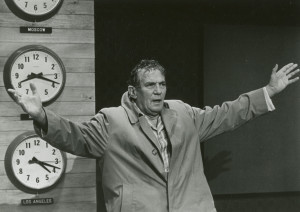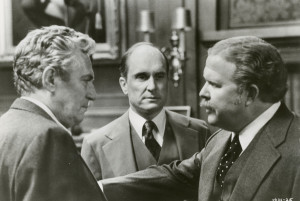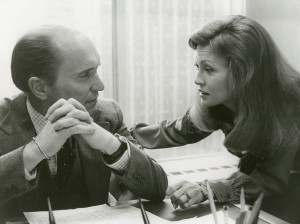by Barb Lentz.
The five movies Bob provided me from which to choose were these:
A Face in the Crowd (1957)
The King of Comedy (1983)
Mark of the Vampire (1935)
Network (1976)
Topkapi (1964)
All of these possibilities look very interesting but this choice was easy: Network. I had, over the years, heard this movie mentioned many times and I was pretty sure that it had won awards. I figured it was high time I finally saw it for myself.

First of all, this viewing revealed to me the origin of the phrase “I’m mad as hell, and I’m not going to take this anymore!”. Over the years I have heard this line dozens of times, if not hundreds, and never known exactly where it began. Now I know. I never knew the actor who said it; this is almost certainly the first Peter Finch film that I’ve seen.
Finch portrays news anchor Howard Beale, who, after being fired, threatens to kill himself on TV. His threat snowballs into an altogether different situation; he suddenly finds himself a bigger star than ever, all because he “tells it like it is.” Howard gets his own propaganda show where he waxes poetic on news topics of the day, produced by female executive Diana Christensen (Faye Dunaway), targeting as much anti-establishment polemic as she can cram on to her network schedule. Her other big show involves bank robbers filming themselves committing crimes and furnishing her with raw footage of their exploits.
Howard gradually loses touch with reality after his best friend Max (William Holden) is unceremoniously fired and the news division merges with the entertainment division. Max begins an affair with Diana, whose real passion is dominating the TV ratings. Eventually the studio executives lose patience with Howard and strike a deal to remove him from the air. Max’s affair with Diana fizzles to a halt and she moves on to another lover while he returns to his wife (who may or may not take him back). Meanwhile, television grinds on, always looking for the next big thing to exploit and profit upon.
I was surprised at how relevant the story is, now forty years later. It foreshadows how news has become secondary to entertainment, how money determines not only what we see as news but how it is presented. Although it is obviously satirical it is also very realistic, at least up until the ending when Howard’s television career comes to an abrupt ending. The movie is all about corruption; the affair between Max and Diana is corrupted by their shared complicity in Howard’s transformation, while Howard is eventually corrupted by having to change his message to suit the head of the studio (Ned Beatty). Television seems to corrupt everything, changing what is real into what is meant to entertain — and to turn a profit.

Another aspect that surprised me involves the religious symbolism and sub-context. Howard Beale, after his transformation, is presented as an oracle for others to follow, a studio-proclaimed “mad prophet of the airwaves.” His behavior and poses (often with arms spread) can be seen as Christ-like, and at the end he is certainly (if not literally) crucified. Plus, the way audiences react to him is indicative that Howard is seen as almost super-human. It’s an interesting facet to a fascinating character.
My top five aspects of the movie are:
1. How relevant it remains forty years later. I never saw this before, but I imagine it was ahead of its time back in 1976. Now, it seems current and contemporary; Howard seems like Donald Trump, only with greater restraint. With docudramas like “Law and Order” so prevalent now, this movie’s reliance on shows developed from current events is not far-fetched at all.
2. Max Schumacher. Max is the conscience of the movie, trying to keep Howard’s job safe, trying to keep the news division from being absorbed by the entertainment division, trying to take care of Howard after his breakdown. But Max is also troubled, leaving his wife for a fling with Diana. At least Max always sees things as they are, and has the fortitude to say what’s on his keen mind.

3. Max’s wife Louise. She only has two scenes, but Louise (Beatrice Straight) makes them count. The second one, when she tells Max exactly what she thinks of him for leaving to be with Diana, is a doozy. The acting in this movie is excellent, but that scene is exceptional.
4. The detail of the dialogue. All of the tirades, while profane, are intricate and well-spoken. The characters are literate, always having something important to say even when they are yelling or swearing. Multiple viewings are probably needed to catch all of the layers of the dialogue, but the first time through, this is impressive stuff.
5. How this is different from movies today. Movies are a visual medium but that doesn’t mean they can’t be talkative and realistic. Network is extremely dialogue-driven, with no music score, shot mainly indoors. It’s almost the opposite of “cinematic,” yet it is a powerful movie in spite of that because it tells a compelling story.
Is Network a classic? Yes. They don’t make movies like this anymore. It is intense, intricate and imaginative, realistic and yet absurd, funny and yet sad. It isn’t uplifting or hopeful — one would think that television programming is only fit for obsessive, delusional people with no consciences, that everything we see and hear is developed by corporate interests to steer us in one way or another, that the struggles behind-the-scenes to get shows on the air are even crazier than we can imagine, and, finally, that television is so powerful that lives like those of Howard Beale are ultimately just fodder for our general entertainment. Some of that is certainly true, but this movie is ahead of its time in satirizing just how far that power extends. At least that’s what I hope.
BRL 18 April 2016.
Network (November 14, 1976) MGM / United Artists
Directed by Sidney Lumet. Produced by Fred Caruso and Howard Gottfried.
Written by Paddy Chayefsky.
Principal Cast (character, performer):
Diana Christensen Faye Dunaway
Max Schumacher William Holden
Howard Beale Peter Finch
Frank Hackett Robert Duvall
Nelson Chaney Wesley Addy
Arthur Jensen Ned Beatty
Edward G. Ruddy William Prince
Louise Schumacher Beatrice Straight
Laureen Hobbs Marlene Warfield
Great Ahmed Kahn Arthur Burghardt
Mary Ann Gifford Kathy Cronkite
121 minutes. Widescreen (1.85:1). Metrocolor. Rated R.
